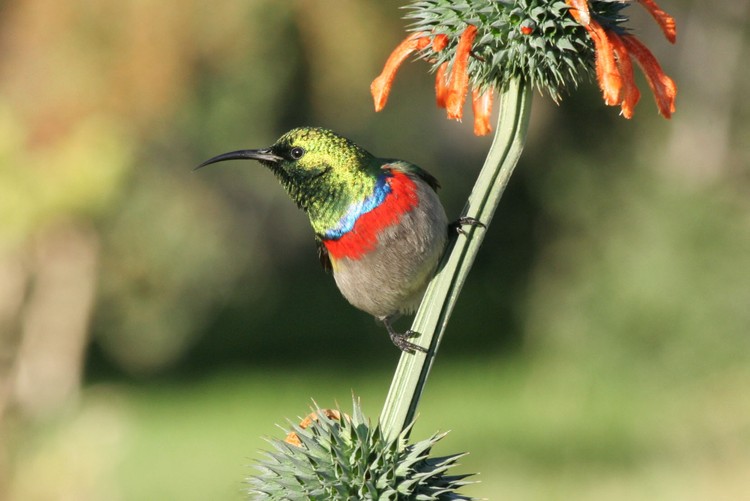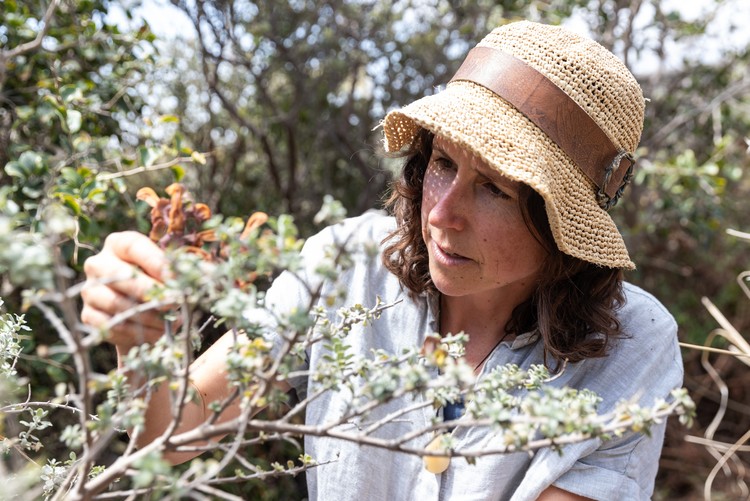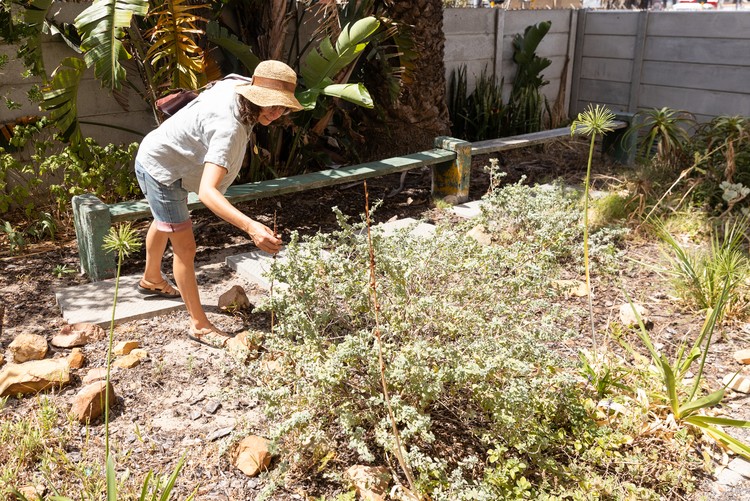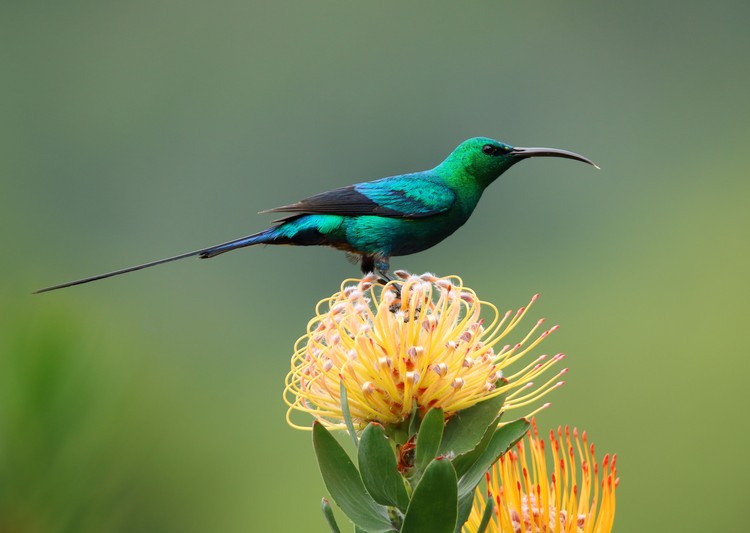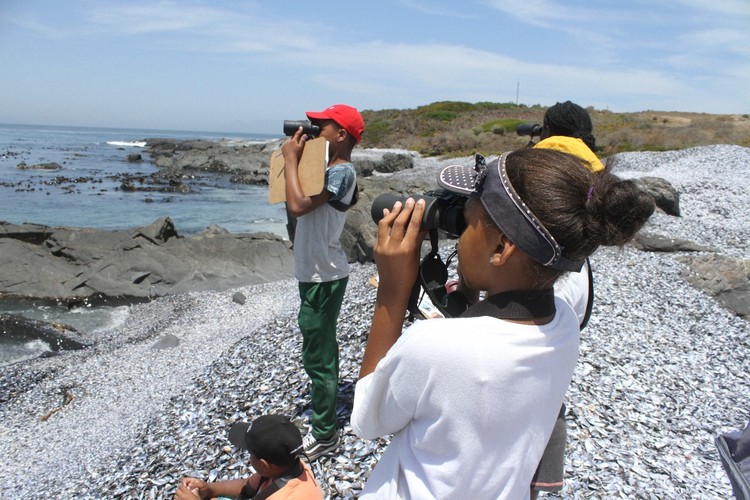Schools are helping sunbirds find their old routes across Cape Town
Urban sprawl has disrupted their migratory patterns
Southern double-collared sunbird on Leonotis ocymifolia. Photo: Joel Simons
A historic route for sunbirds between the Table Mountain National Park and the Boland Mountains is being restored by Ingcungcu Sunbird Restoration, using fynbos gardens in schools across the Cape Flats.
Ceinwen Smith, executive director of Ingcungcu, says the birds travel between the mountain ranges of Muizenberg and Stellenbosch, but the route has been “broken” by urban sprawl.
Sunbirds cannot fly for more than a kilometre and half without stopping to feed. Establishing gardens at schools to act as “filling stations” for the little birds helps them to complete their natural movement.
Smith says the disruption of bird movement and the destruction of their habitat has endangered many species endemic to the Cape Flats.
Ceinwen Smith, executive director of Ingcungcu Sunbird Restoration, says that urban sprawl has destroyed the natural habitats of sunbirds on the Cape Flats. Photo: Ashraf Hendricks
It is not only about the birds, but also about improving the well-being of children by getting them into nature. The Cape Flats suffers from a lack of accessible natural spaces. With the birds, come educational classes and the formation of “eco-clubs”, where primary and high school children do outdoor activities such as drawing, mapping, species research and bird monitoring.
They also do field trips at least twice a year. Smith says that they want to inspire “a sense of excitement about nature”.
“Yes, it’s about the birds and about fynbos, but you can plant all the gardens and you can note all the birds, but if people don’t care for those spaces, they’re gone,” she says.
Smith says that the birds are also pretty and bring aesthetic value to the landscape. “Everybody likes the sound of birds rather than traffic,” she says.
A fynbos garden at Muizenberg Junior school acts as a filling station for sunbirds and other nectar feeding birds. Photo: Ashraf Hendricks
Doreen Vizant, a teacher at Floreat Primary in Retreat, runs the school’s eco-club. She says that the outdoor classes help her to teach students about topics like photosynthesis outside rather than only in their textbooks. This way learners can “see, feel and even taste” the subject matter.
Vizant says that many learners live in flats without yards. The gardens at the school teach them how to look after things and work as a team.
Joel Simons, schools program manager at Ingcungcu, said the students build the gardens themselves to create care and custodianship. They do the site analysis, mapping, prepare the ground, plant and take care of the gardens. He says they don’t want it to feel like another “planting project” but to “create a long lasting commitment to the space”.
The eco-clubs also introduce the learners to “unusual subjects that aren’t offered at schools that could lead to career paths”, such as bird watching and mapping. And the field trips give them access to parts of the city otherwise inaccessible to them.
Simons says that many of the students that join the eco-club have some type of struggle. “The club provides a space for them to be part of something”.
At some schools, the eco-club is the only extra curricular activity outside sports.
“Children are finding solace, community and belonging where maybe it’s not being provided to them … whether it be at home, on the streets or in school,” he says.
Ashlyn Lawrence, in grade 6 and an eco-club member, says that he feels good when surrounded by nature. “I feel like the plants are cuddling me”, he says.
But it hasn’t been plain sailing. Smith says that their involvement in Lavender Hill had to be pulled back because of gang violence. The resources at some schools are limited and some struggle with thievery and vandalism. Plants have been pulled out and fencing removed. “If the school does not have a secure perimeter, it can be really challenging”, she says.
A masters thesis by Bongani Mnisi at the Cape Peninsula University of Technology provided the foundation in 2013 for the project. Since then, nine schools have established gardens, and six are participating in the eco-club program. The schools are Crestway High, Steenberg High, Sibelius High, Floreat Primary, Prince George Primary, Harmony Primary, Muizenberg High, Levana Primary and Lavender Hill High.
Malachite Sunbird on a Leucospermum Flower. Photo: Sjirk Geerts
In 2021, a report – Nectar gardens on school grounds reconnect plants, birds and people – was released. It found a significant increase in birds over time. It said that over five years, the sunbird population increased by 35%.
Ingcungcu Sunbird Restoration receives funding from many sources including Table Mountain Fund-WWF, Cape Bird Club, and Botanical Society of South Africa - Kirstenbosch. Recently it has got crowdfunding via BackaBuddy, as well as fundraising events. The project is part of a fynbos pathway collaboration with Greenpop and Communitree.
Learners from Floreat Primary school attend an eco-club excursion at Bokbaai camp. Learners did a variety of activities including bird watching and nature walks. Photo: Ingcungcu Sunbird Restoration
Next: Judge takes hard line against Stalingrad tactics
Previous: Years of protests pay off as Eastern Cape village gets new high school
© 2024 GroundUp. This article is licensed under a Creative Commons Attribution-NoDerivatives 4.0 International License.
You may republish this article, so long as you credit the authors and GroundUp, and do not change the text. Please include a link back to the original article.
We put an invisible pixel in the article so that we can count traffic to republishers. All analytics tools are solely on our servers. We do not give our logs to any third party. Logs are deleted after two weeks. We do not use any IP address identifying information except to count regional traffic. We are solely interested in counting hits, not tracking users. If you republish, please do not delete the invisible pixel.

